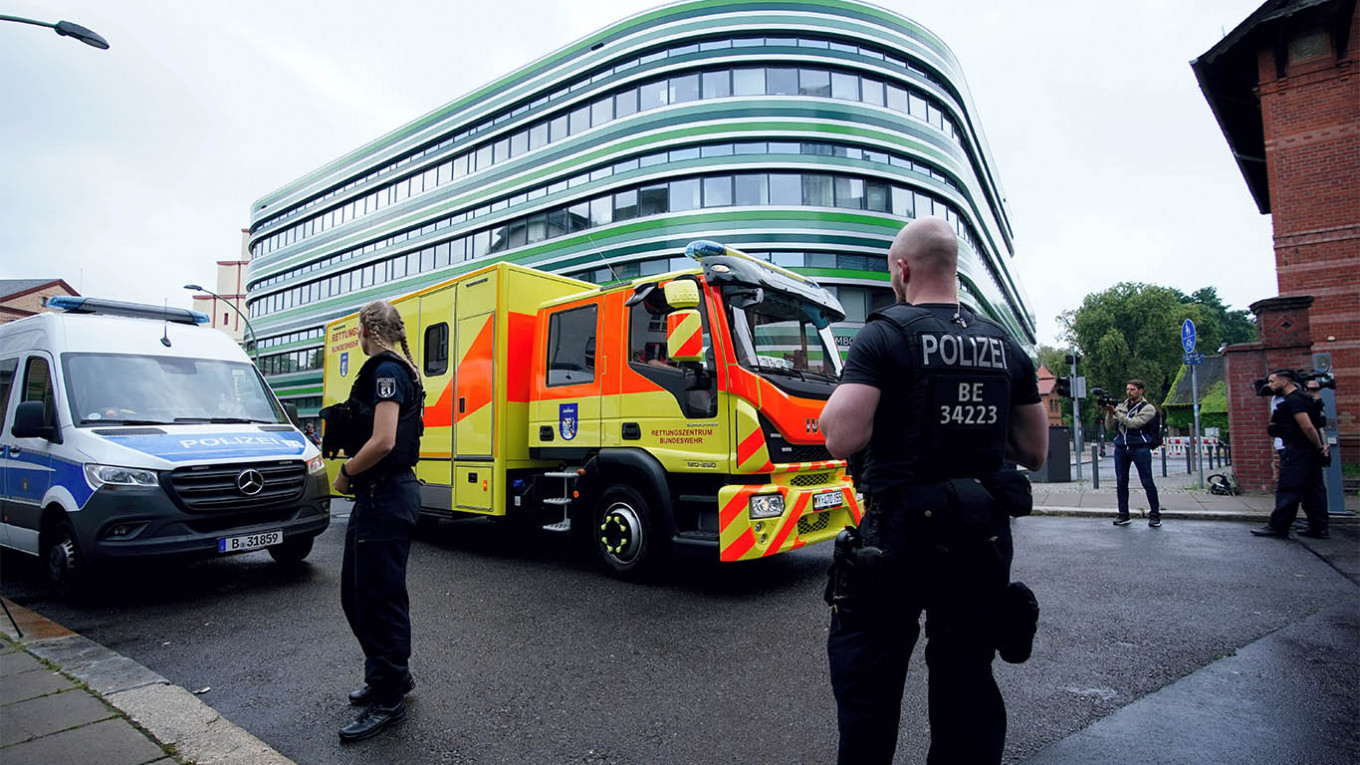Contrary to popular belief, Russia’s regime is less than enthusiastic about its supporters carrying out acts of violence. It prizes its monopoly on violence and last ceded it to amateurs after the anti-government protests of 2011–2012 and during the war in eastern Ukraine, when the Kremlin needed volunteers for its proxy war there. Eventually, state media coverage stopped praising the adventurers and holidaymakers in the ranks of the separatist forces, and the authorities tried to bring them under state control before ultimately pushing them out of the public eye.
Today’s situation, from the protests in Khabarovsk to the unrest in Belarus, echoes those past crises. But it may be so serious that it requires the Kremlin to intervene directly rather than act through surrogates.
Enter Navalny’s poisoning. Whoever stands behind the attack, its logic could have been that having an enemy in the rear is too dangerous when a battle with foreign foes — one with the West over the fate of Belarus—is likely imminent. Whether or not President Vladimir Putin personally made or signed off on the decision, the episode highlights the degradation of authoritarianism in Russia in demonstrating that the regime, or some part or parts of it, considers it necessary to go beyond the usual tools of state propaganda, electoral fraud, political technology, and targeted, non-lethal repression.
Navalny’s brush with death stands apart even from past assassinations in which the Kremlin was accused of having a hand. Alexander Litvinenko and Sergei Skripal were exiles who were targeted in a foreign land, the UK, and unknown to Russians and foreigners alike before their poisonings. Navalny, by contrast, is well known inside and outside Russia, on whose soil he was attacked, and a figure from Russia’s present — if not its future — rather than its past. As former security service members, Litvinenko and Skripal may have been seen by Russian intelligence as traitors worthy of punishment, whereas Navalny is an opposition politician who operates in the open rather than covertly.
Navalny’s poisoning, then, eliminates the distinction previously drawn by Putin between enemies and traitors, the former being deserving of respect. If that line has been erased, it suggests that the regime — certainly its most hardline elements — feels more endangered than ever.
The place where Navalny was poisoned — Tomsk, deep inside Russia — renders implausible the claim that he was targeted by Russia’s enemies with the goal of damaging its international standing. And the manner in which he was attacked was sophisticated, unlike the killings of Boris Nemtsov and Anna Politkovskaya, so much so that it cannot be blamed on rogue or overzealous surrogates like the Chechens.
None of that has stopped Lukashenko from offering up a conspiracy theory about Navalny’s poisoning that points the finger at the West. The Belarusian president’s intervention in the Navalny affair ties it to his country’s unrest, even if the demonstrations did not factor into the decision to attack the opposition leader.
Few will believe the version of events implied by Lukashenko’s purported recording of a phone call between officials in Berlin and Warsaw. But that suits Minsk just fine, since its release is meant to provide Russia’s state propaganda with yet another dubious narrative with which to muddy the waters.
In a different situation, Lukashenko would have kept such an explosive recording to himself, going only as far as using it as leverage in his bargaining with Moscow. Yet his life-or-death predicament is forcing him to go to unusual lengths and even make himself look foolish and ridiculous, all so that Russia concludes that he is a useful ally worth propping up.
Crucially, Lukashenko still has his limits. He is unlikely to formally recognize Abkhazia’s independence or Crimea’s status as Russian territory or hand over to Russia’s oligarchs the Belarusian state assets or state companies they covet. Even so, making less costly concessions — like saving Putin from having to charge that Germany lied about what happened to Navalny — may suffice to get Moscow to forget his campaign rhetoric, which was unequivocally anti-Russian.
Lukashenko’s gamble aside, Germany’s role in the affair merits discussion. Curiously, Merkel — not Navalny’s doctors, the health minister, or the police — personally announced the diagnosis. The German leader knows full well, as would any chancellor, that her country’s relations with Russia, whatever its behavior, will have to be maintained, if only because Germany is more responsible for the state of Europe than either France or the United States.
Yet Merkel still assumed the role of accuser, on top of her role in doling out the punishment for Navalny’s poisoning. She wants to avoid being viewed as a Putin or Kremlin lobbyist or finding herself in a situation where someone else has charged Russia with attacking Navalny yet she is pushing for the completion of Nord Stream 2.
She has agreed to be both the prosecution and the defense. Her advocacy of Nord Stream 2 forces her to play the latter role anyway, and not playing the former role would have meant looking less principled vis-à-vis Putin than NATO Secretary-General Jens Stoltenberg and former U.S. vice president Joe Biden, both of whom were bound to weigh in on Navalny’s poisoning regardless of Merkel’s actions.
By personally declaring that Navalny was, in fact, poisoned and suggesting it had something to do with the Russian state, Merkel pre-empted the criticism of her relationship with Putin she knew would come from other Western politicians.
As for the material penalties Russia faces, it will be difficult to impose targeted sanctions, as the UK did in response to the Litvinenko and Skripal poisonings, given that the West has not been given any names and is unlikely to be provided with any material evidence. Navalny’s Anti-Corruption Foundation may conduct its own investigation and share its findings and conclusions with the West, but that is the best for which the West can hope.
In the cases of Crimea’s annexation and the war in eastern Ukraine, it was clear to all that the Russian state, or major regime elements, was culpable, justifying economic sanctions. Where individual murders are concerned, targeted sanctions are the West’s go-to response.
In the case of Navalny’s poisoning, however, the difficulty of identifying the culprits increases the likelihood that broader sanctions will be imposed, a step that will be especially painful amid the economic disruption of the coronavirus pandemic but which Europe will probably feel compelled to take.
This article was first published by the Carnegie Moscow Center.
A Message from The Moscow Times:
Dear readers,
We are facing unprecedented challenges. Russia's Prosecutor General's Office has designated The Moscow Times as an "undesirable" organization, criminalizing our work and putting our staff at risk of prosecution. This follows our earlier unjust labeling as a "foreign agent."
These actions are direct attempts to silence independent journalism in Russia. The authorities claim our work "discredits the decisions of the Russian leadership." We see things differently: we strive to provide accurate, unbiased reporting on Russia.
We, the journalists of The Moscow Times, refuse to be silenced. But to continue our work, we need your help.
Your support, no matter how small, makes a world of difference. If you can, please support us monthly starting from just $2. It's quick to set up, and every contribution makes a significant impact.
By supporting The Moscow Times, you're defending open, independent journalism in the face of repression. Thank you for standing with us.
Remind me later.








